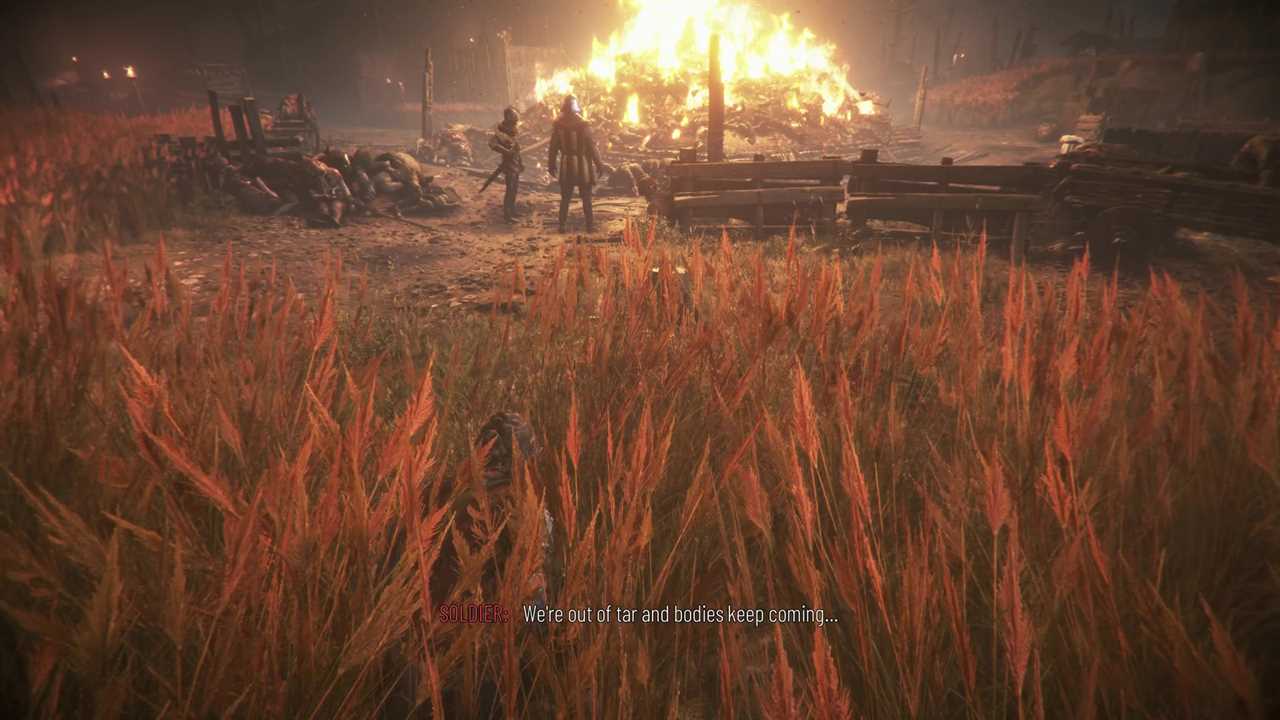A PLAGUE Tale: Requiem takes place in 14th-century France, while the country was still in the grips of the black plague.
Despite the devastating disease and the horrors of war, Requiem is a tale of family and friends coming together to push back against the tide of grief.

A Plague Tale: Requiem offers stunning scenery.
Those who played the first game, Innocence, will remember our protagonists Hugo and Amicia.
Requiem starts out shortly after the siblings turn the plague against the Inquisition, while they are still on the road to reach their mother and Lucas.
Their journey will lead them to a quiet city that houses a member of the mysterious order.
This network of alchemists are the pair’s hope of curing Hugo’s curse, the Macula, which connects his mind to a sea of rats buried beneath the earth.
Requiem’s environments will dazzle you, from sprawling expanses of flowery fields, to flowing rivers with muddy banks with castles crumbling off in the distance.
These detailed environments add to the horror, as Amicia wades through waist-high water filled with corpses, allowing you to feel the desperation of the time.
Its innocent opening helps you get used to the controls, which feel a lot more comfortable than the original.
Amicia still has her sling with its huge wind-up animation, but the crouching and stealth are easier to pull off.
Dipping in and out of cover, hiding under carts and in broken down sheds, and smashing pots as distractions now feels painless.
However, the distance at which enemies aggro can still feel frustrating, and Requiem is not a game where you can abuse the stealth system.
The game has its ups and downs as you experience the turmoil and disappointments of the plot through the protagonists.
Rats will respond to Hugo’s grief. The worse his mental state gets, the more they will come to the surface and wreak havoc.
For 12 out of the 15 chapters in Requiem, you will bounce between stealth mission and story with a few forced encounters in between.
However, these encounters are for the most part challenging in a way that doesn’t feel satisfying.
It slowly introduces heavier armour archetypes and shield-bearers, which have to be defeated using a string of different techniques.
There are a lot of steps involved in taking each one down, and you have to do this while keeping smaller flanking enemies at bay.
Amicia can only withstand two hits from these smaller enemies, or just one from these larger ones, so each fight becomes a puzzle.
With only a short time at your disposal, you have to work out the correct tools for a quick and effective kill, while also prioritising the order.
In Chapter 13, they ramp up this aspect of the game by bringing in waves of enemies while providing you with little visuals and few checkpoints.
You can easily be close to reaching a checkpoint only to be sniped by a spear-thrower and sent back to try it all over again.
This is the one area that Amicia’s crossbow bolts regenerate, likely because of how difficult this encounter is.
However, as this is the only time it happens as a player you don’t expect it.
If the developers knew the encounter was too difficult, they should have adjusted the fight, not the main mechanics of the game.
These issues aside, the story and pacing are excellent right up until the game’s final moments.
Requiem knows when to lay it on thick, and when to let the player ease up to help them through the story.
It lets you get attached to a character before you watch them take a surprise arrow through the jugular.
Or you could be enjoying a quiet moment when a hoard of rats bursts up through the ground.
You have to be in the right state of mind in order to enjoy A Plague Tale: Requiem; as the title suggests, the game is very dark.
It plays out like a crash course in the psychological impact the war, death, and illness have on children.
No matter how devastating an event in Hugo and Amicia’s lives is, the pair have to continue on without the time to process their grief.
Requiem plays out like the siblings death march, as you experience the waves of suffering they endure to protect each other.
The story is fantastic, the progression system makes sense, and the environments are as stunning as they are eerie.
It’s a worthy sequel to Innocence, leaving you with the right amount of sorrow.
Requiem allows you to grieve, but also tells you to move on. Combat aside, it shows the player the path that grief can take, in a way many other games couldn’t.
A Plague Tale: Requiem releases October 18, for PS5, Xbox Series X|S, Nintendo Switch, and PC.
Written by Junior Miyai and Georgina Young on behalf of GLHF.
Did you miss our previous article...
https://trendinginthenews.com/gaming/amazon-prime-subscribers-can-get-ten-rare-fifa-23-fut-cards-for-free-heres-how






